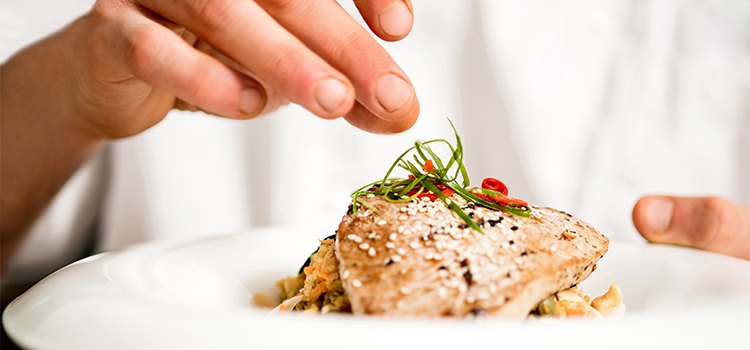Culinary Career Success Stories
Two culinary school grads define their culinary career goals—and how school helped them get there.

Meet Two French Culinary Institute Graduates
Rob Seixas, Senior Editor for Zagat Survey, 2001 Graduate
Robert Bleifer, Executive Chef for Food Network, 1994 Graduate
Culinary careers cover much more than being a chef. There are culinary careers to fit all sorts of people with all kinds of goals, and the paths to these careers are as varied as the jobs themselves. Robert Bleifer, an executive chef for Food Network, and Rob Seixas, a senior editor for Zagat Survey, both attended The French Culinary Institute. Read on as they describe how their experiences led to very different opportunities.
Life Before a Culinary Career
When Rob Seixas graduated with a degree in journalism, he found a job opening at Zagat Survey, the popular dining and entertainment guide based on customers' surveys. As a senior editor, Seixas understood the importance of details in a successful restaurant but wanted to explore the culinary arts even further. "I wanted to learn what the restaurants have to go through to be the best, and the level of detail, the energy, the stress, the hard work that is required to do that," Seixas says.
Already working in New York, Seixas found the decision to attend The French Culinary Institute an easy one to make. "It has the best reputation and is generally a feeding school for the top-level restaurants. I'd be very surprised to see a top-level restaurant that didn't have at least one chef who attended The French Culinary Institute."
Choosing The French Culinary Institute
Food Network chef, Robert Bleifer, didn't realize his true desire for a culinary career until he had already completed a master's degree in photography. "I jokingly blame my mom," says Bleifer. "When I was little and stayed home with her, she would always have cooking shows on and tell me to help her take notes. She was a great cook, and we were always exposed to different types of food."
After shifting his career goal to chef, Bleifer thoroughly researched his choices for an intense but worthwhile program at a culinary arts institute. "Being a career changer, I was looking for something short and sweet," Bleifer says. So, upon consulting two chefs, Bleifer looked into The French Culinary Institute, which offered a full-time, six-month program. "I asked them what they would find more valuable: a student who had completed a two-year program with less experience or a student who had completed six months of education and had time to gain more real-life experience. Both said they would prefer the student with more experience."
Standing the Heat of Culinary School
At the beginning of his part-time program, "I barely knew how to hold a knife, much less how to master the techniques the instructors were showing us," Seixas admits. Still working full time at Zagat while attending the culinary arts institute, he improved his basic cooking skills by practicing at home on the weekends.
Bleifer also describes his first days at culinary school as extremely overwhelming, even though he had a considerable amount of experience in the kitchen when he began his education at The French Culinary Institute. "What was most surprising was how much I still had to learn," Bleifer recalls. "On day one, I realized I knew absolutely nothing."
Advice for Culinary Arts Students
Bleifer advises culinary students to be prepared for the physical demands of a culinary career, which can be just as challenging as the mental demands. He mentions the long hours required for making it in the restaurant business and says that in the beginning, "You have to learn how to stand on your feet for hours and be okay with having someone constantly telling you what to do." Another major obstacle? Getting used to the heat, which can reach as high as 130 degrees.
Both Bleifer and Seixas also recommend networking with other students. Not only can this lead to job opportunities after graduation, but as Seixas experienced, other students not only offer motivation in the shape of friendly competition, but also another avenue for learning new skills. Working at L'Ecole, The French Culinary Institute's restaurant, was "in the beginning, very stressful," recalls Seixas. "The people going to the restaurant were real paying customers. But I was able to learn and improve by watching other students who were already working in restaurants."
Where They Are Now
After completing the program at The French Culinary Institute, Seixas obtained an advanced certificate at the International Wine Center in New York and says he is now completely "obsessed with the culinary arts, restaurants and food." A typical workday for Seixas begins by "catching up on what's going on in the restaurant world" along with writing and editing reviews for Zagat books.
After graduating from The French Culinary Institute in 1994, Bleifer has held several different positions in the industry. After a busy year in the restaurant scene, Bleifer checked for new opportunities through the job placement program at The French Culinary Institute, which pointed him in the direction of the Food Network.
Freelancing for the Food Network paved the way to becoming a food stylist, a position that Bleifer held for five years. Now an executive chef for Food Network, Robert Bleifer and his team run the production kitchen for shows such as "Emeril Live," "Iron Chef America," "Semi-Homemade with Sandra Lee," "Boy Meets Grill," "Guy's Big Bite" and "30-Minute Meals." On top of that, he caters in-house events for Food Network, "anywhere from lunch for four people to dinner for 135 and cocktail parties for up to 200 people."
FIND A CULINARY SCHOOL TODAY
Tell us a little about yourself and we'll connect you with schools that offer culinary arts programs.
